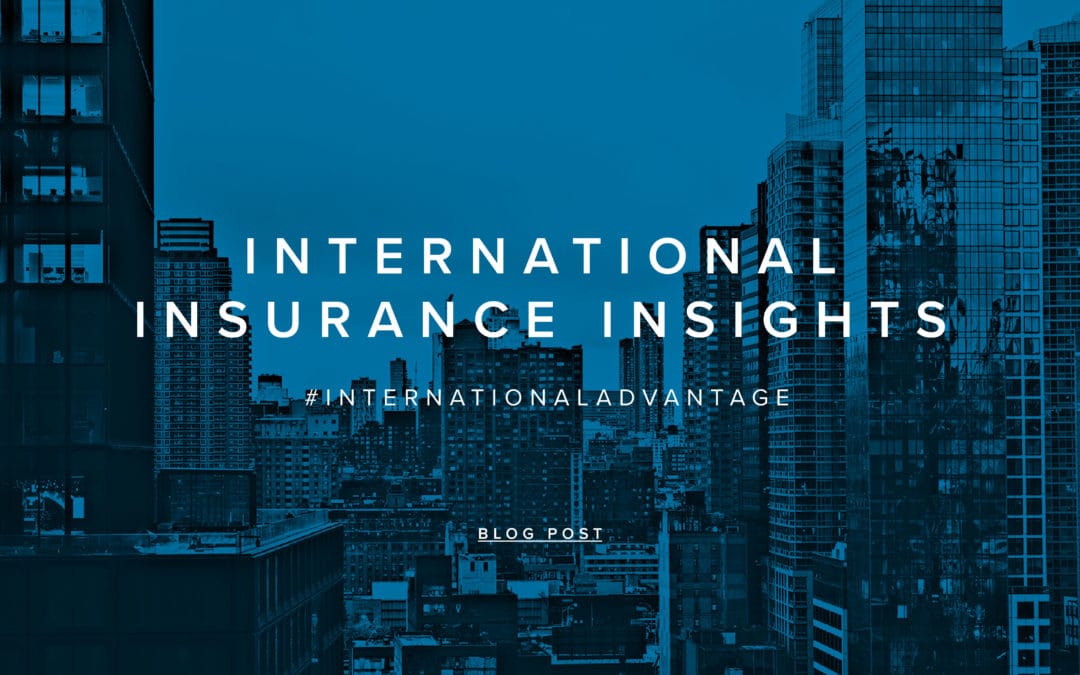Events, developments, and opportunities in the international insurance marketplace.
Recent Successes in International Insurance:
- Placed Property & Business Interruption coverage for a manufacturer of high specification HVAC and Electrical suspension systems expanding into Western Europe.
- Put in place a managed worldwide program including local Partner Broker services across nine overseas territories for Property & Liability for a global designer and manufacturer of commercial and at-home fitness equipment.
Global
In a survey, more than 5,000 chief executives globally expressed record optimism about economic growth. This is just one year after the World Health Organization declared COVID-19 a global pandemic. The survey, conducted in 100 countries, found that 76% forecasted improved economic growth in 2021. This represents the highest level of optimism since the same survey started asking this question in 2012. Optimism was particularly strong in North America and Western Europe, at 86% and 76% respectively. CEOs in the technology and telecommunications sectors expressed the highest levels of confidence at 45% and 43% respectively. The least confident were CEOs in hospitality and leisure at 27%, followed by transportation and logistics at 29%. The United States is the leading market that chief executives are looking to for growth at 35%, seven percentage points ahead of China.
New political developments and existing tensions are increasing the focus of U.S. CEOs on Canada and Mexico and reducing the emphasis on China. As far as threats to growth prospects are concerned, pandemics and health crises topped the list. These overtook the fear of over-regulation – the perennial leading concern for CEOs globally since 2014. A significant increase in cybersecurity incidents in 2020, including ransomware attacks, has resulted in cyber threats leaping up the threat list. Cyber threats have become the second-biggest concern, cited by 47% of CEOs. Also rising rapidly up the list of concerns is the spread of misinformation. Another concern is tax policy uncertainty as government deficits continue to grow, which is expected to result in higher taxes.
Spain
Spain has various legal mechanisms to protect employees against accidents, disabilities, or death when carrying out their workplace duties. Social Security, for example, provides universal coverage in case of illness. There is also disability or life insurance that most companies are obliged to obtain for their employees. This is driven by which collective agreement (Convenio) a company depends on. While these insurances offer protection to employees, they do not cover the liability of the employer. For this exposure, an extension for Employer’s Liability can be included within a General Liability policy, which will provide protection for personal injury claims due to workplace accidents for which the Insured is responsible due to negligence.
The basis of the indemnity imposed on the employer is calculated using a scale system known as the “Baremo”. Baremo regulates civil liability and insurance matters in road traffic accidents. Baremo uses a table where each contributing factor has a score range, with the total score forming a base as to what indemnity should be paid. A suggested good local standard limit for Employers Liability might be €450,000 per person, but in certain fields (e.g. construction) higher limits should be considered. In most cases, insurers would need the number of employees (white collar / blue collar), payroll, and claims experience to include the clause.
Lebanon
Insurers in Lebanon have received at least 16,000 claims for estimated losses of close to $1.1bn from last year’s August 4th Beirut Port explosions. That is according to a report released in February by the Insurance Control Commission (ICC), Lebanon’s insurance regulator. Only $60m of this total has been settled so far. The value of compensations being sought exceed the capital of local insurance entities. International reinsurers are withholding compensation payments pending the official outcome of investigations. Also, most arrangements between local insurance bodies and international reinsurers excluded acts of war and terrorism.
To date, there has been no official report on the causes of the explosions. Without an official report on the causes, insurers and reinsurers are unwilling to pay compensation. If it was learned that the blast was a result of a terrorist attack or act of war, compensation from insurers would be limited to policyholders who hold terrorism, political risk or war damage cover. Payouts to date follow the ICC urging insurers to settle claims related to the blast for the most vulnerable insured clients – mainly small policyholders – without waiting for the findings of the judicial investigation into the incident.
Contact Us
With a unique position in the international risk management and employee benefits marketplace, we have the ability and resources to help you globally. To learn more, please contact our office at 1-800-661-1518 to speak with an international advantage team member.

